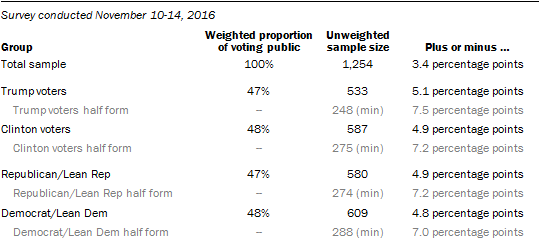The analysis in this report is based on telephone interviews conducted November 10-14, 2016 among a national sample of 1,254 voters (“Voters” are those who said they voted in the 2016 election). The interviews were conducted among registered voters, 18 years of age or older previously interviewed in one of two Pew Research survey conducted of 1,567 registered voters in August 9-16, 2016 and 2,120 registered voters in October 20-25, 2016 (for more on the methodologies of the original surveys, see here and here). The survey was conducted by interviewers at Princeton Data Source under the direction of Princeton Survey Research Associates International. Interviews were conducted on both landline telephones and cell phones (312 respondents for this survey were interviewed on a landline telephone, and 942 were interviewed on a cell phone). Interviews were conducted in English and Spanish. Interviewers asked to speak with the respondent from the previous interview by first name, if it was available, or by age and gender. For detailed information about our survey methodology, see https://legacy.pewresearch.org/methodology/u-s-survey-research/
Weighting was performed in two stages. The weight from the original sample datasets was used as a first-stage weight for this project. This first-stage weight corrects for different probabilities of selection and differential non-response associated with the original interview. The sample of all registered voters contacted for this survey was then raked – by form – to match parameters for sex by age, sex by education, age by education, region, race/ethnicity, population density, phone use. The non-Hispanic, white subgroup was also raked to age, education and region. These parameters came from the weighted demographics of registered voters interviewed from the original surveys from which sample was drawn. In addition, a parameter was added to the weighting so that the vote results reported in the survey match the actual popular vote results. Sampling errors and statistical tests of significance take into account the effect of weighting.
The following table shows the unweighted sample sizes and the error attributable to sampling that would be expected at the 95% level of confidence for different groups in the survey:

Sample sizes and sampling errors for other subgroups are available upon request.
In addition to sampling error, one should bear in mind that question wording and practical difficulties in conducting surveys can introduce error or bias into the findings of opinion polls.
Pew Research Center undertakes all polling activity, including calls to mobile telephone numbers, in compliance with the Telephone Consumer Protection Act and other applicable laws.
Pew Research Center is a nonprofit, tax-exempt 501(c)(3) organization and a subsidiary of The Pew Charitable Trusts, its primary funder.


